Graduated with a degree in economics from Reed College, the famous school that Steve Jobs attended, Tran Vu Quang - founder and CEO of OnPoint jokingly said: "Because Steve Jobs dropped out of school, he became a billionaire. But I graduated, so I had to work for hire...".
In 2022, OnPoint is the most prominent startup in the field of e-commerce in Vietnam when it successfully raised 50 million USD from SeaTown Holdings. This is also the largest capital raising deal in Southeast Asia in the field of e-commerce support services. After 2 successful rounds of capital raising (the first was 8 million USD and the second was 50 million USD), Tran Vu Quang - founder and CEO of OnPoint shared: "For me, the goal of becoming a unicorn (a company with a valuation of 1 billion USD or more) is just a milestone, not a destination. The desire to serve 100 million customers in Southeast Asia is a more important destination".
But the founder also added: "No one wants to invest $50 million to only get $200-300 million in the future. First, we have to achieve the expected growth rate in 2023 - an extremely difficult year for the entire economy in general, including the e-commerce industry."
After graduating from Reed College, Tran Vu Quang passed the rigorous selection rounds to join McKinsey (only 1% of the excellent students from top universities who applied were accepted) - the world's leading strategy consulting group in the US. After 2 years at McKinsey, Quang moved to Lazada to work at the invitation of 2 former McKinsey founders of this company.
After that, Quang accepted the recommendation of another former McKinsey to become the personal assistant of billionaire Pham Nhat Vuong (Chairman of Vingroup ) in the field of e-commerce. Then Tran Vu Quang left Vingroup to return to Lazada before finding the big challenge of his life by starting a business with OnPoint - a startup specializing in providing e-commerce support services (e-commerce enabler) in 2017...

What made you choose McKinsey as your first job right out of college?
Before that, I read the book "The Startup of You" written by the co-founder of LinkedIn and realized that sometimes when you don't know what to do, you should choose a field with many options. McKinsey is such a place. Of course, because McKinsey is a world-famous company and brings great learning opportunities.
McKinsey’s nature since its establishment is that they will hire fresh graduates because they value problem-solving methods over experience. At McKinsey, all projects are done in groups, small projects have 3-4 people, large projects have 10-12 people. Therefore, new employees will have the opportunity to learn from the project team or experienced senior employees. After joining McKinsey, I worked in the Hanoi office.
Specifically, what valuable lessons did you learn while working at McKinsey?
The first is problem-solving skills. This is extremely useful whether at McKinsey or elsewhere, because you have to identify the right problem before you can solve it. The second is working in an environment where there is always something new, so you have to learn constantly, with constant deadline pressure, so you have to constantly change and adapt extremely quickly to be able to do it yourself. In particular, you have to complete the work with very high standards because working at McKinsey also means consulting for leaders and top managers in large corporations.
In my consulting work at McKinsey, I have to work with many people at different levels, with different interests. I am not their boss, but I have to work in a way that can support them and the business. Thanks to that, over time, I have built a system of brothers and friends who can support each other. All these hard and soft skills are very useful, helping me to survive wherever I work, always determined to do my best and focus on results.

Having only worked for 2 years, with a huge opportunity to learn, why did you decide to leave McKinsey for Lazada - a newly established company and also in a completely new field: e-commerce?
In 2013, I was working on a project in Jakarta (Indonesia), and the McKinsey office was in Hanoi, so I had to fly back and forth between the two places a lot. Every week, I had to fly 4-5 times because there were no direct flights from Hanoi to Jakarta. Usually, I would return to Vietnam on Friday night, spend Saturday with my wife and children, and then spend the whole day on Sunday on the plane to Indonesia. At that time, there were times when my child was sick and I couldn’t stay home, so I wanted to find a job that would allow me to spend more time with my wife and children.
In addition, after working at McKinsey for 2 years, I asked myself whether I wanted to continue working here for another 5-7 years and then be promoted to director or whether I wanted to do new things and create influence.
At that time, I also wanted to learn more about startups and leadership. Coincidentally, Maximillan Bittner and Pierre Poignant, the CEO and COO of Lazada Group at that time, who also worked at McKinsey, contacted people here to come work for Lazada in Vietnam.
To be honest, in September 2013, I didn’t really understand Lazada or e-commerce (laughs). At that time, I always wanted to do something about startups, and Lazada was also a startup.
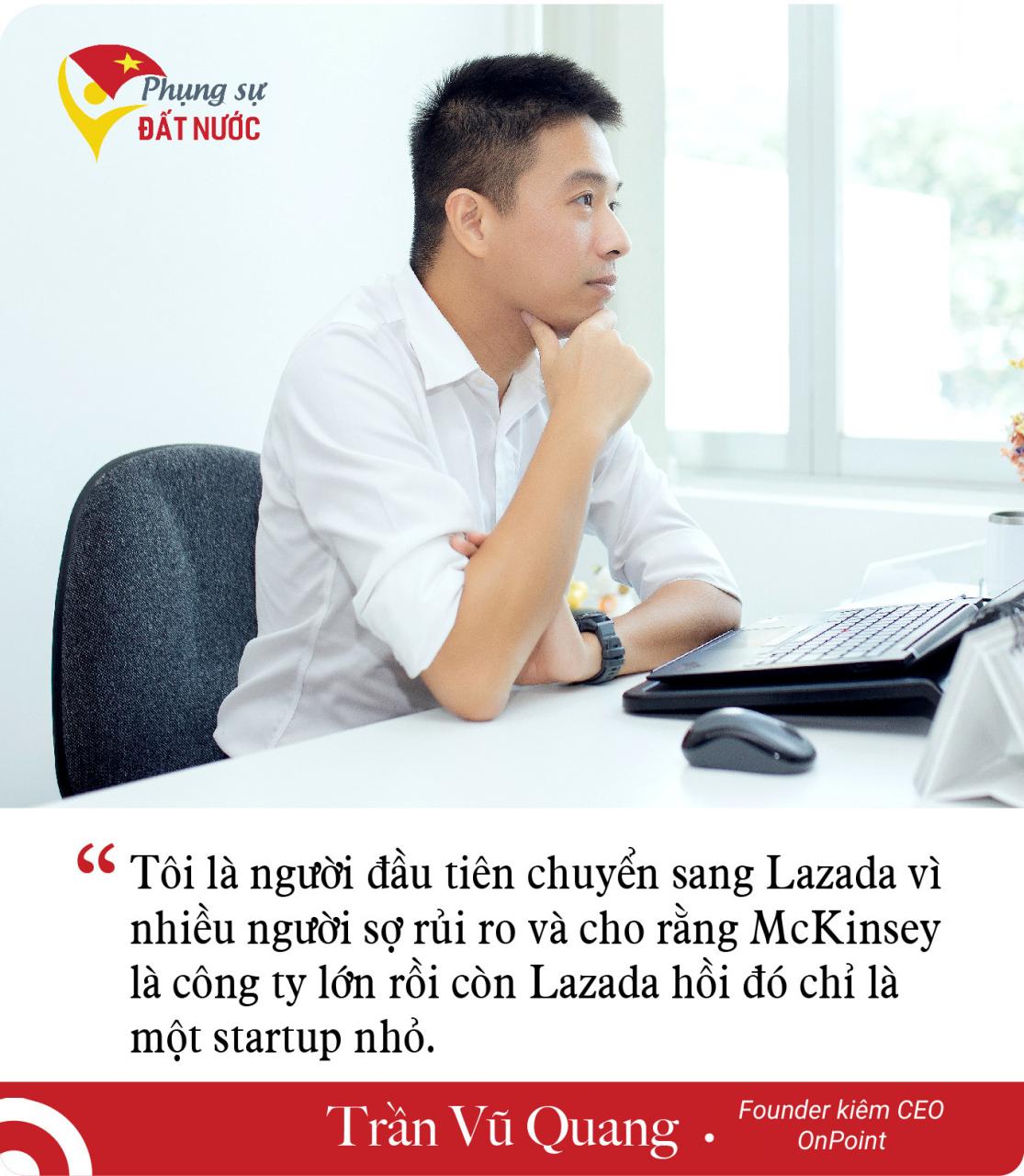
If I work here, the working environment will give me the right to learn and to be free to develop. Moreover, I thought that I should choose a fast-growing industry, then I will have more opportunities to learn. This is also the reason why I decided to move from McKinsey to Lazada. At that time, I was the first person from McKinsey in Vietnam to move to Lazada because many people were afraid of risks and thought that McKinsey was already a big company while Lazada was just a small startup at that time.

Why did you leave Lazada after less than a year to become a personal assistant to billionaire Pham Nhat Vuong?
At that time, I had a friend who was working at McKinsey and this company was also doing a consulting project for VinGroup. My friend first worked as an assistant to Mr. Vuong, then asked me if I wanted to meet Mr. Vuong. Of course, I really wanted to meet the first USD billionaire of Vietnam because I wanted to learn about his way of thinking. I flew to Hanoi to meet Mr. Vuong and agreed.
In addition to liking Mr. Vuong, another reason was that Lazada was owned by a European company at that time – Rocket Internet (Germany), with a build to sell model. At that time, I met many sellers on Lazada to convince them to switch from the buy-sell model to the market place model (at that time many people did not understand this model), but I found that the service quality of my company was not good. Lazada spent a lot of money on marketing, but out of 10 people who came, 7 were not satisfied and did not return. That was what I did not like – not focusing on service quality with the build to sell model.
Working with Mr. Vuong will help me learn about customer service because VinGroup's service quality is generally good. And I went to Hanoi to work as his personal assistant in the Adayroi e-commerce project.
When working as a personal assistant, what did you learn from Mr. Vuong and what impressed you the most?
Mr. Vuong has the ability to think, learn new things and make critical arguments very quickly. In each new field, Mr. Vuong has his own assistant to advise, synthesize information, and help him learn new things very quickly. Second, he often thinks extremely big, always thinking that he has to do 10, even 100 times more instead of 2-3 times more as everyone thinks.
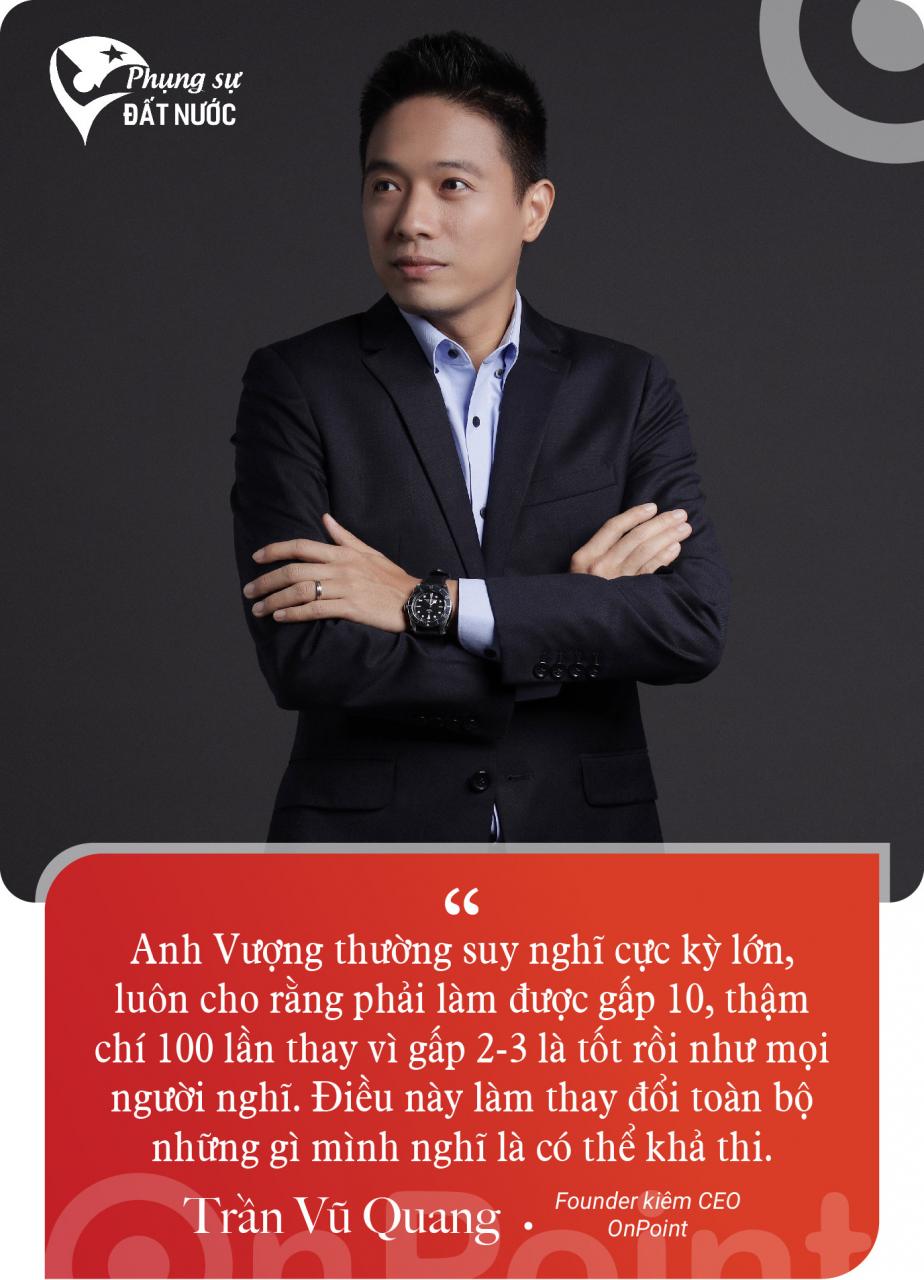
This changed everything I thought was possible. Like wanting to do 50-100 times bigger, faster than normal progress, with even higher quality. Mr. Vuong built a trust in his employees that once he said it could be done, they would do whatever it took to get it done.
Another point is determination. Mr. Vuong is extremely determined in action, and extremely disciplined. At that time, I did not understand everything. When I left VinGroup and worked at OnPoint, there were things I observed there that I am applying in my company.
I learned from Mr. Vuong the desire to help the country develop more - the kind of desire for the Great Vietnamese Spirit - For a better life for the Vietnamese people, the ability to learn a lot of new things and apply them to reality right away. In particular, I learned determination, goal orientation, doing it to the end, not giving in, not lowering standards and when a business model fails, stopping immediately.
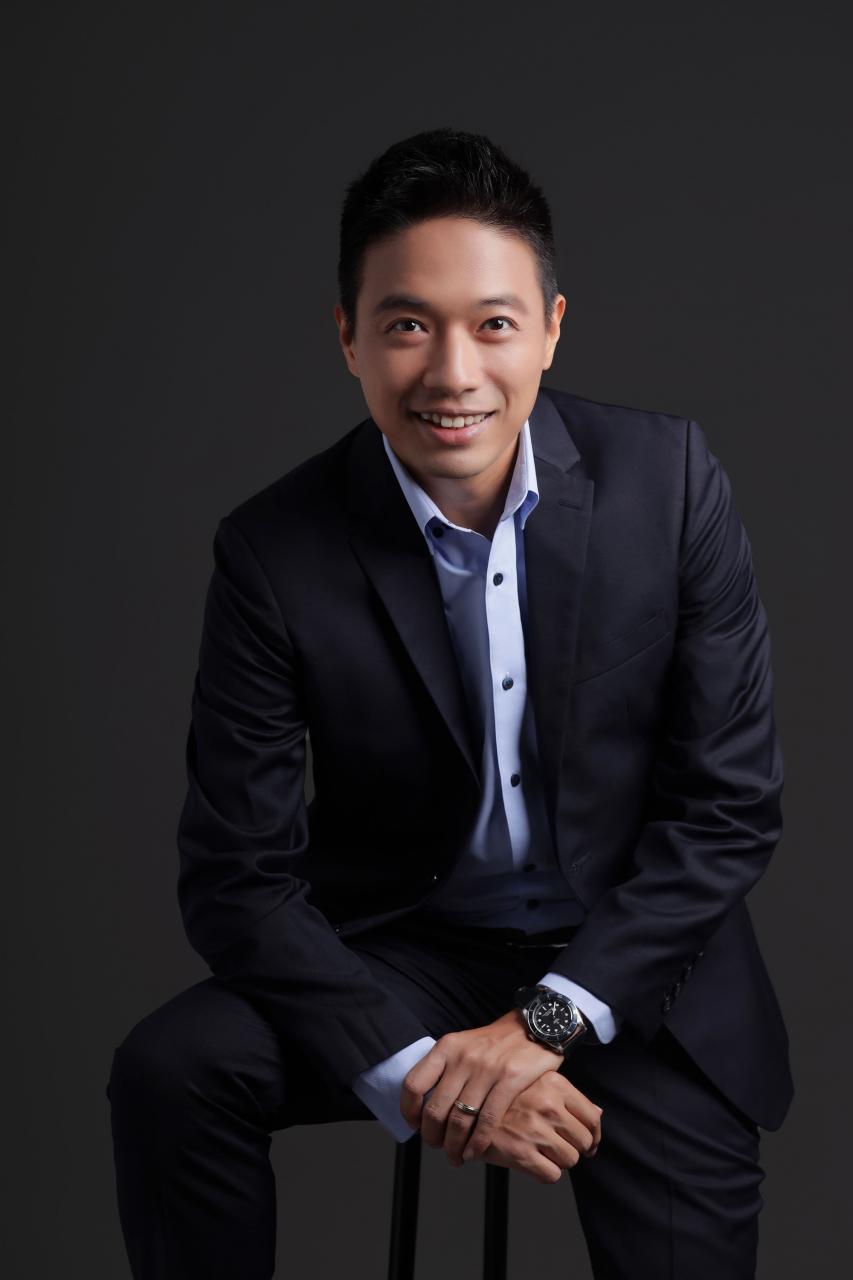
But just half a year later, he left this position and returned to Lazada as Commercial Director. Is there any special reason for "running back and forth" to Lazada?
After working at VinGroup for a while, I realized that I was not really suited to the Vietnamese corporate environment. Perhaps because I was used to working at McKinsey, an American company, Lazada, a European company, so the working style was completely different... During that period, Adayroi was also in the process of exploring, so it did not fit in with the culture of VinGroup in general. I also asked myself whether I wanted to work for a salary or to do something bigger.
At the same time, my old boss at Lazada was promoted to CEO and invited me back. He wanted to put Vietnamese people in high positions because of their long-term commitment instead of choosing foreigners. It is a fact that they often leave within 6 months to 1 year or ask for a salary increase many times over. In addition, I also noticed that the quality of service here has changed, they listen and solve the problems of sellers.
So I agreed to come back and became the first Vietnamese to hold a C-Level position at Lazada in late 2014.

Holding the position of Commercial Director at Lazada - the number 1 e-commerce platform in Vietnam in 2017, why did you decide to quit your job and establish OnPoint?
First, I think I was very inspired by the meeting and handshake with Jack Ma in 2016 in Singapore. At that time, when Alibaba invested in Lazada, Jack Ma and Lucy Peng (CEO of Alipay) went to Singapore to meet the management team. During the meeting, he talked about the difference between Alibaba and Amazon: Alibaba is a platform, while Amazon is an empire.
Empires make themselves grow, even destroy others; platforms serve others, make their businesses better. Alibaba wants to serve 2 billion people in the world, help 10 million small and medium-sized enterprises do business better, and create more than 100 million jobs.
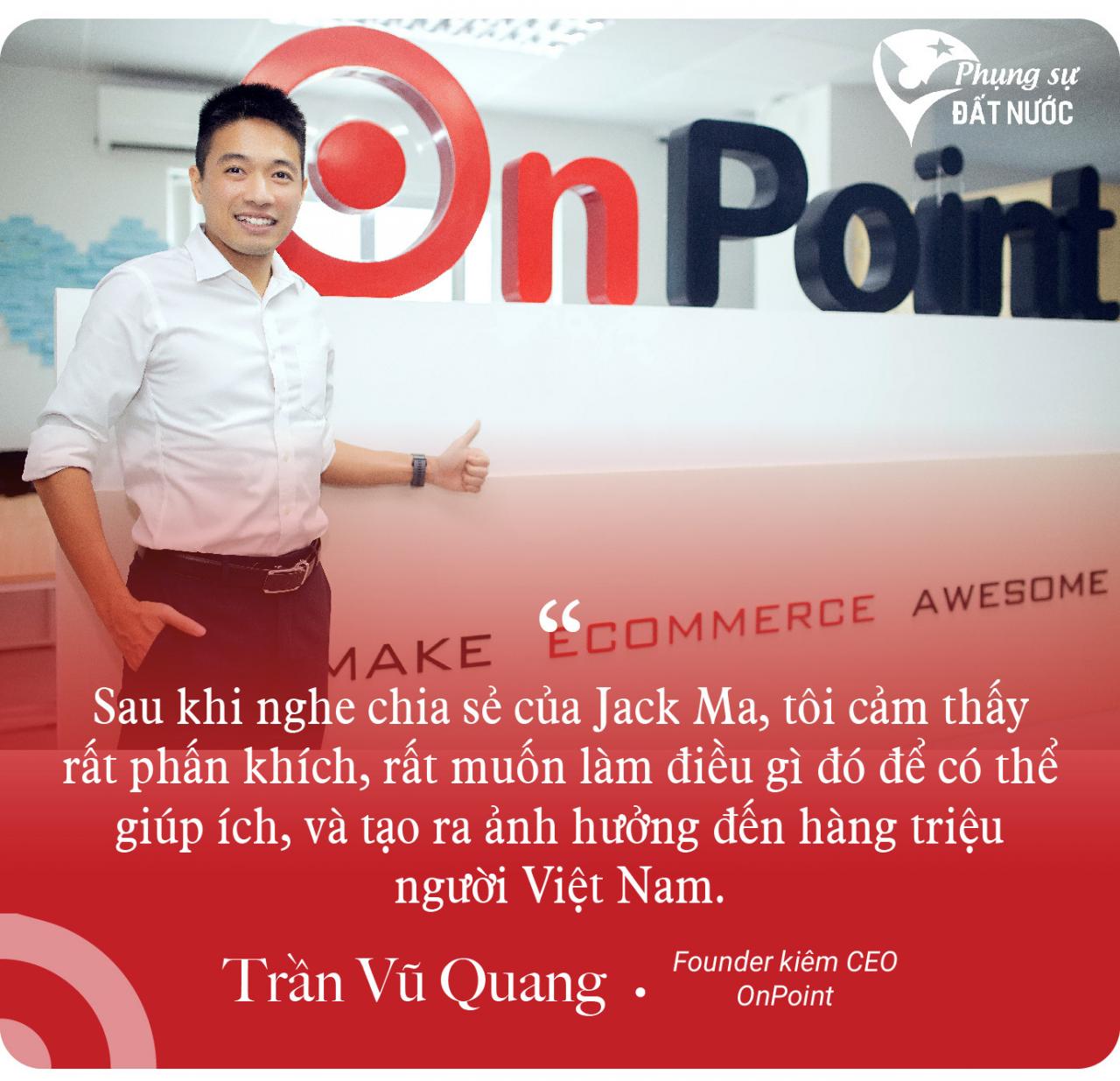
When I heard that, I felt very excited, wanting to do something to help, and make an impact on millions of Vietnamese people... Because I was born into a family where both parents are doctors: my father is an emergency physician, my mother is a dermatologist. Since I was little, I have been in an environment where my parents always helped, saved the lives of patients, and were very dedicated. When I was little, my father bought me books like Noble Hearts..., reading many books like that created compassion in me.
I often tell you guys here: "The motivation that drives me to do OnPpoint is to help people. I want to see how meaningful and influential my work is to others. Coming to e-commerce in the past 9-10 years is just a fate for me."
One of the direct reasons that motivated me to establish OnPoint was that after Alibaba invested in Lazada, many brands came to this e-commerce platform but the two sides did not have a common voice. Lazada wanted brands to reduce prices to be cheaper than other platforms, but brands said: "Then I will lose or it will affect the price of offline channels, I want to develop sustainably and need new features such as how to promote, how to reduce prices appropriately".
At that time, the model and operation of the platform for brands were not yet optimal. That was the reason I left Lazada to found OnPoint: I saw a need in the market, and the model to exploit this need had been successful in other countries. But the biggest concern when starting a business is whether the business model has been proven or not, and there are also customers with pain points that need to be solved.
Furthermore, e-commerce is a rapidly growing field, I have passion, knowledge and think that if I start a business, I can do better than the solutions available on the market and create more impact than staying at Lazada.
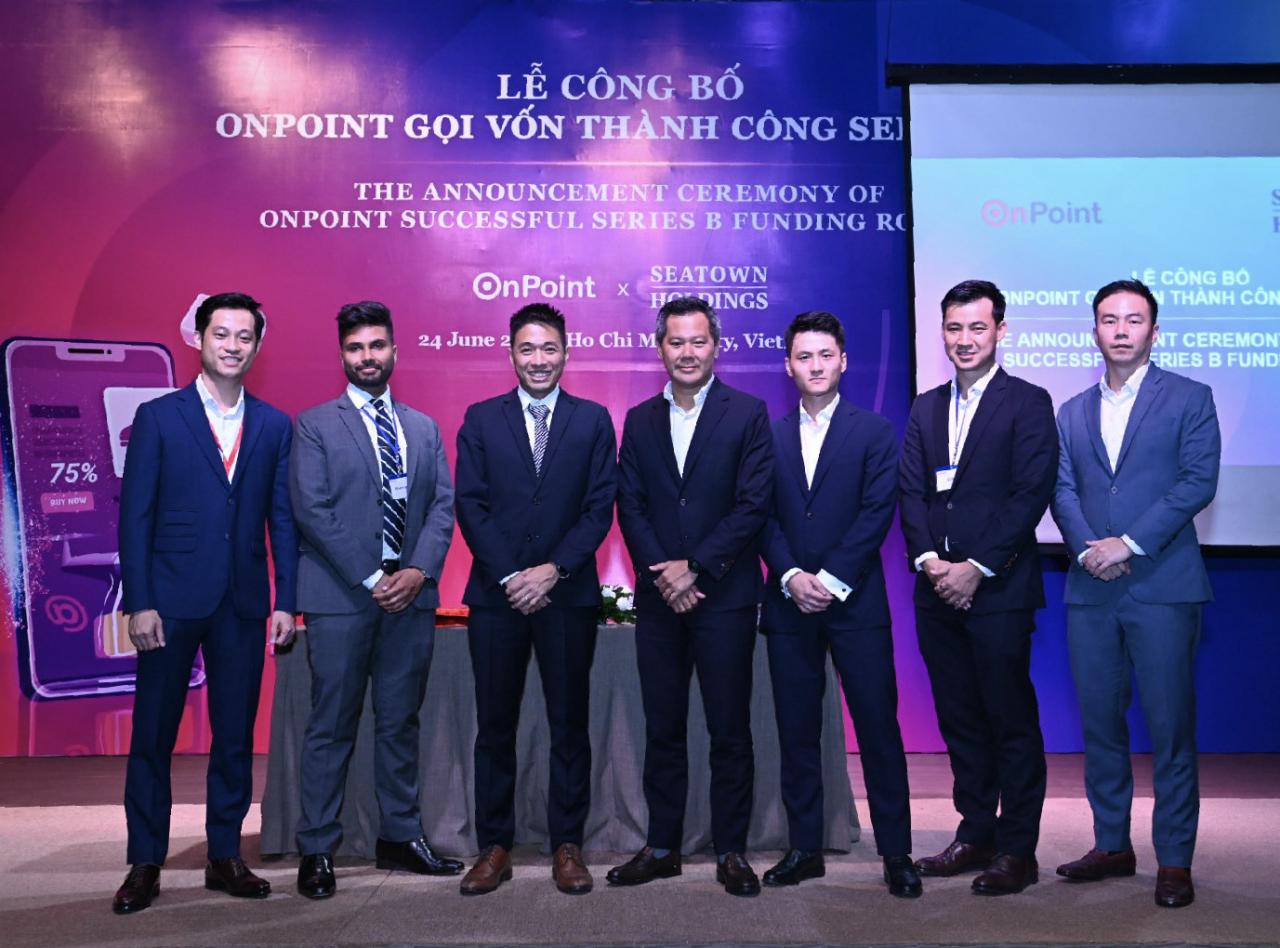
After 3 years of development, OnPoint decided to raise capital. In 2020, OnPoint successfully raised 8 million USD and by 2022, the next round will be up to 50 million USD. So what made OnPoint's value increase so quickly in just 2 years?
The first is growth. OnPoint has grown very rapidly in recent years. We have gained many new customers, opened many new product lines... and created trust with investors. In early 2022, OnPoint entered the Top 500 largest private enterprises in Vietnam (in terms of revenue), according to Vietnam Report's ranking.
The second is technology application. After the $8 million round of funding, we accelerated our investment in engineering, data, and technology. And the software built and developed by the OnPoint team is very good, not only for our own use, but also sold to some other companies abroad such as in the Philippines. Currently, they still use OnPoint's software in the form of monthly payments.
Third is customer satisfaction. In addition to operating well for brands, by the end of 2021 - before investors poured money into OnPoint for the new round of funding - we had served more than 3 million customers on e-commerce platforms.
OnPoint's rapid growth is based on our own developed technology platform and optimized operating costs, creating a clear difference from other competitors in the market. At the same time, this also shows investors OnPoint's great potential for future growth.
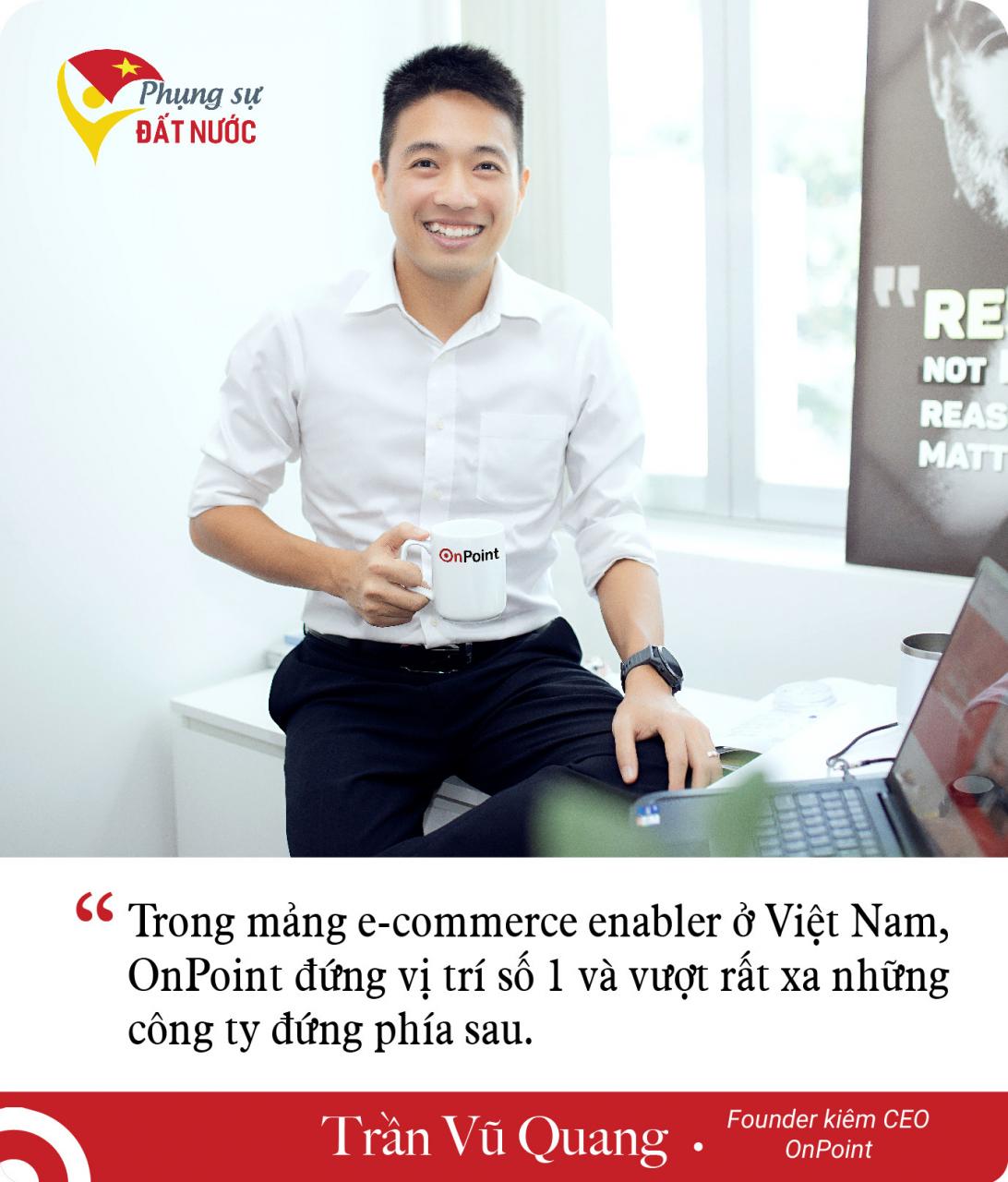
In fact, in the e-commerce enabler segment in Vietnam, OnPoint is ranked No. 1 and far surpasses the companies behind. The Vietnamese e-commerce market is very potential with nearly 100 million people, expected to be 40-50 billion USD in the next 3 years and has the leading growth rate in Southeast Asia... Those are the reasons why Onpoint's valuation increased sharply in the next capital call.

Since OnPoint was founded, has there been a time when you felt it was too difficult and wanted to give up?
There are many difficulties but I have not wanted to give up because I always want to be the "last man standing". This originated from the movie "Unbroken" which is based on a true story about the survival battle of American Olympic athlete - Louis Zamperini.
Years of training and competitive running in high school and college helped Louis gain the steely spirit and courage needed to stand firm and survive after being captured as a prisoner of war. He overcame fear, torture and abuse during his years of imprisonment by the Japanese to return home. The movie inspired me greatly when I started my startup: Whatever you do, you have to survive, if you survive, you will have a tomorrow.
People often say that a startup must go through three near-death experiences before it can grow. That’s why I’m always ready to accept such life-and-death moments (laughs).
Running a startup is a bit like running a marathon. At the starting line, there are many people running together. Look left, look right, there are competitors, but the further you run, the more competitors will fall away, and perseverance will help you become the "last man standing".
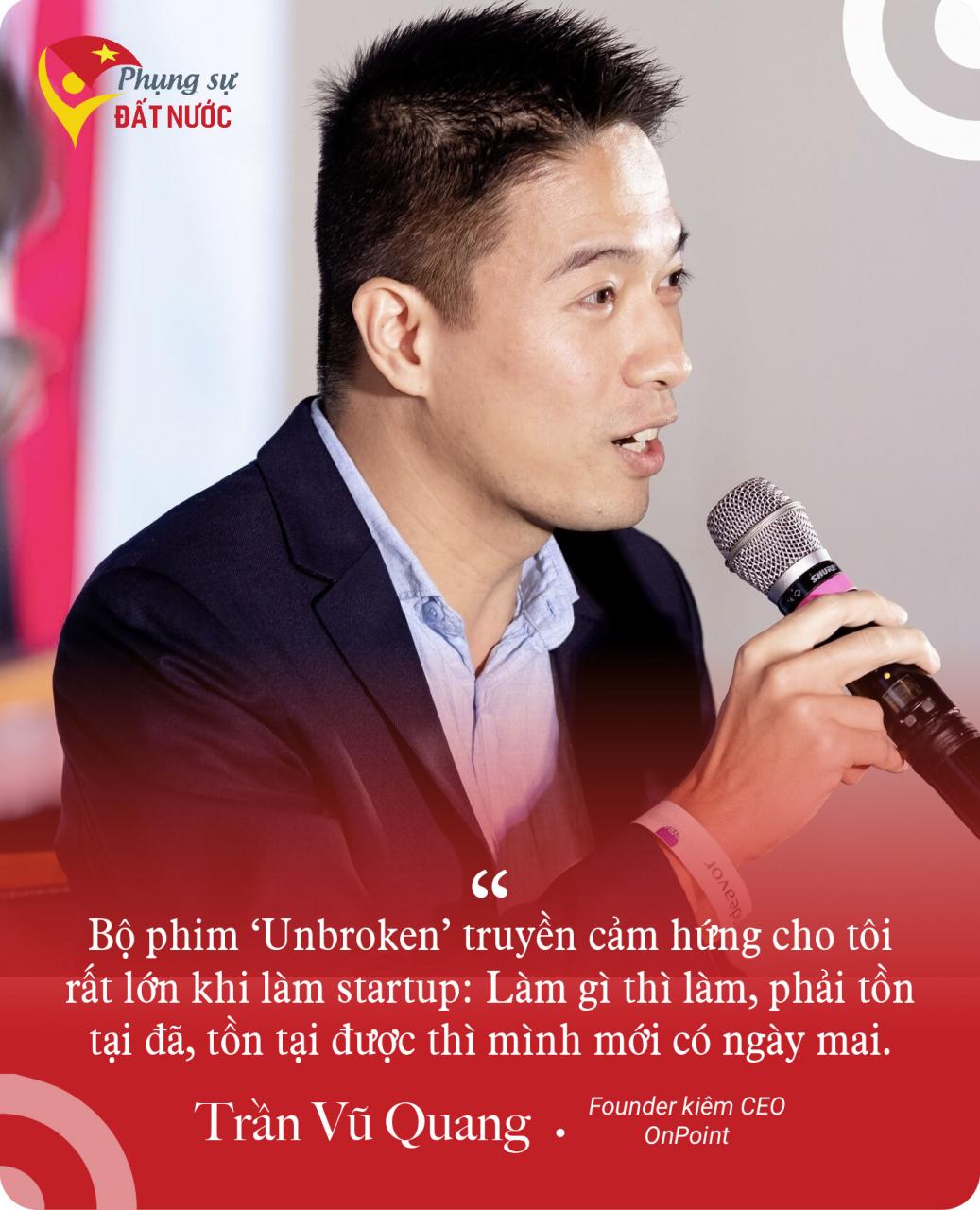
Can you share about OnPoint's near-death experience?
In OnPoint’s first year, we had to move offices 3 times and warehouses 4 times. Because every time we finished building a new warehouse, about 2 months later, orders increased again, so we had to invest in building a bigger warehouse. Or when the warehouse was just put into operation, the land was taken back.
During this time, OnPoint grew rapidly, at one point increasing 50 times. However, due to lack of professional knowledge in finance and accounting, cash flow could not be managed. The more it grew, the more cash flow was lacking, and this could be considered a near-death experience.
But that’s normal. In the beginning, although OnPoint shareholders had many similar values, we didn’t discuss which was the top priority: profit growth, cash flow, market share, or customer care. In 2017-2018, we thought we needed to try to grow well to have good sales, then we would have a high valuation to raise capital.
However, the faster we grow, the more we lose, our cash flow gets stuck. If we focus on customer satisfaction, we will have to invest a lot in systems and services. That investment is huge, and a small company cannot do it…
Therefore, it is important that shareholders and management agree on what is the top priority. Then all the choices become easier. This is also a lesson for me because there is really no MBA course or anyone who can teach you those things, you can only learn gradually on your own.

How far is OnPoint's goal of becoming Southeast Asia's No. 1 e-commerce support service provider going and does the company have plans to become a "unicorn"?
In fact, OnPoint has not gone far yet. In 2023, OnPoint will focus more on the Vietnamese market. Talking about goals, in addition to traditional e-commerce platforms, OnPoint also wants to become number 1 on e-commerce platforms on social networks such as TikTok Shop, Facebook...
At the same time, OnPoint is looking for investment and cooperation opportunities with e-commerce enablers in other countries. OnPoint wants to collaborate with them to provide services or invest in them to expand to other markets. However, we are still waiting for a more ripe time to decide to invest.
When becoming a startup, everyone wants to become a "unicorn". However, for me, the goal of becoming a "unicorn" is just a milestone, not a destination.
In terms of vision, I often think that if I have attracted 200 brands, can I increase this number to 600? Or if I currently serve 20 million customers in Vietnam, then in the future I want to serve 100 million customers in Southeast Asia...
With those goals, I find them much more meaningful and motivating than becoming a unicorn or reaching a billion-dollar revenue. In my opinion, the billion-dollar capitalization goal is just a milestone at a certain point in time because the company's valuation will fluctuate according to the stock market. Personally, OnPoint and I will focus more on the values we create.
As for future ambitions, OnPoint hopes to IPO overseas at a very large valuation. I believe current investors will want the same. No one wants to spend $50 million to get only $200-300 million in the future.
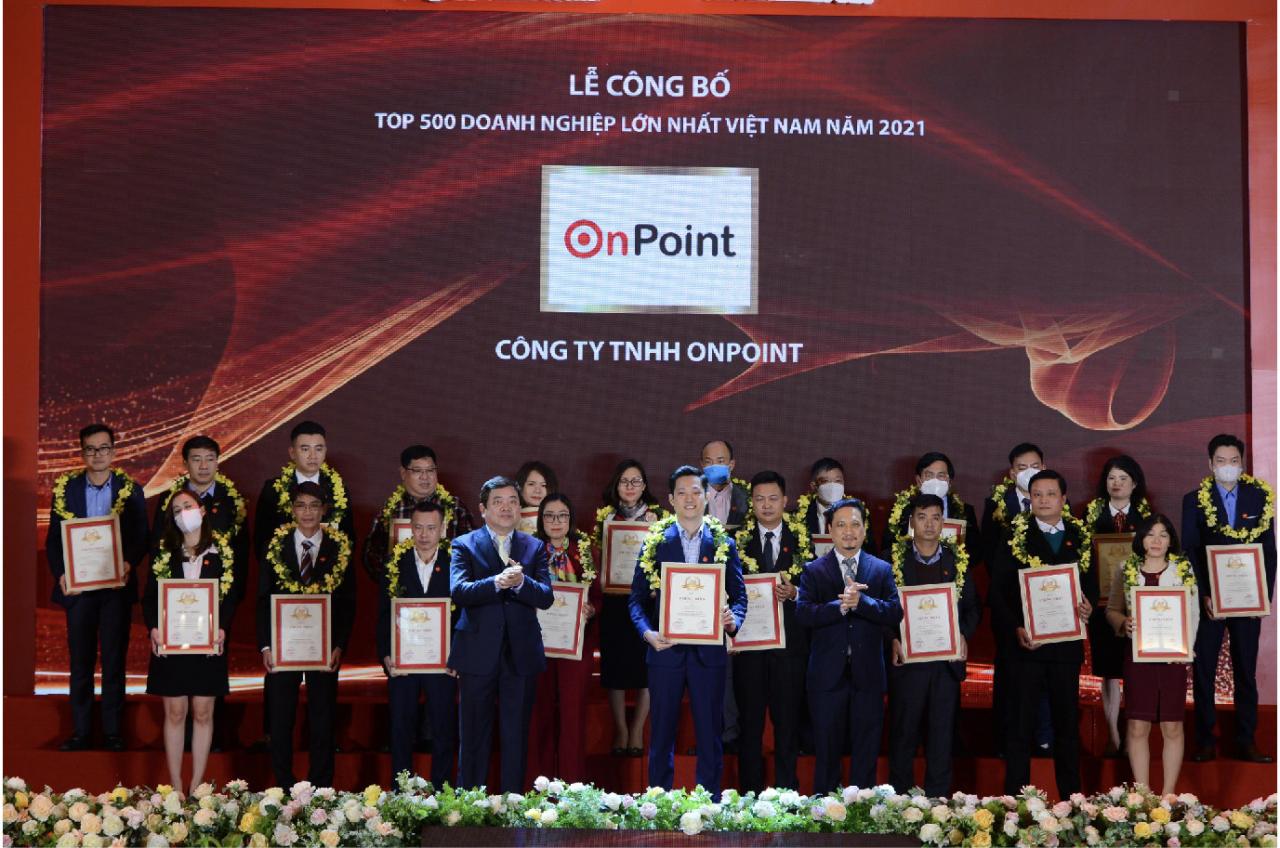
As an avid runner, what do you find interesting between running marathons and running a startup?
In fact, I find that marathons help me become more alert, think more clearly, practice high discipline at work, improve my health and have a positive impact on my work.
In particular, marathons have taught me how to accept failure. Specifically, I monitor the results regularly and learn to gradually accept failure. The important thing is that I learn from them and what to do to do better next time. The same goes for business, you always have to have monthly, quarterly, and yearly goals. When you finish a campaign, review all the results, reflect, and learn from them.
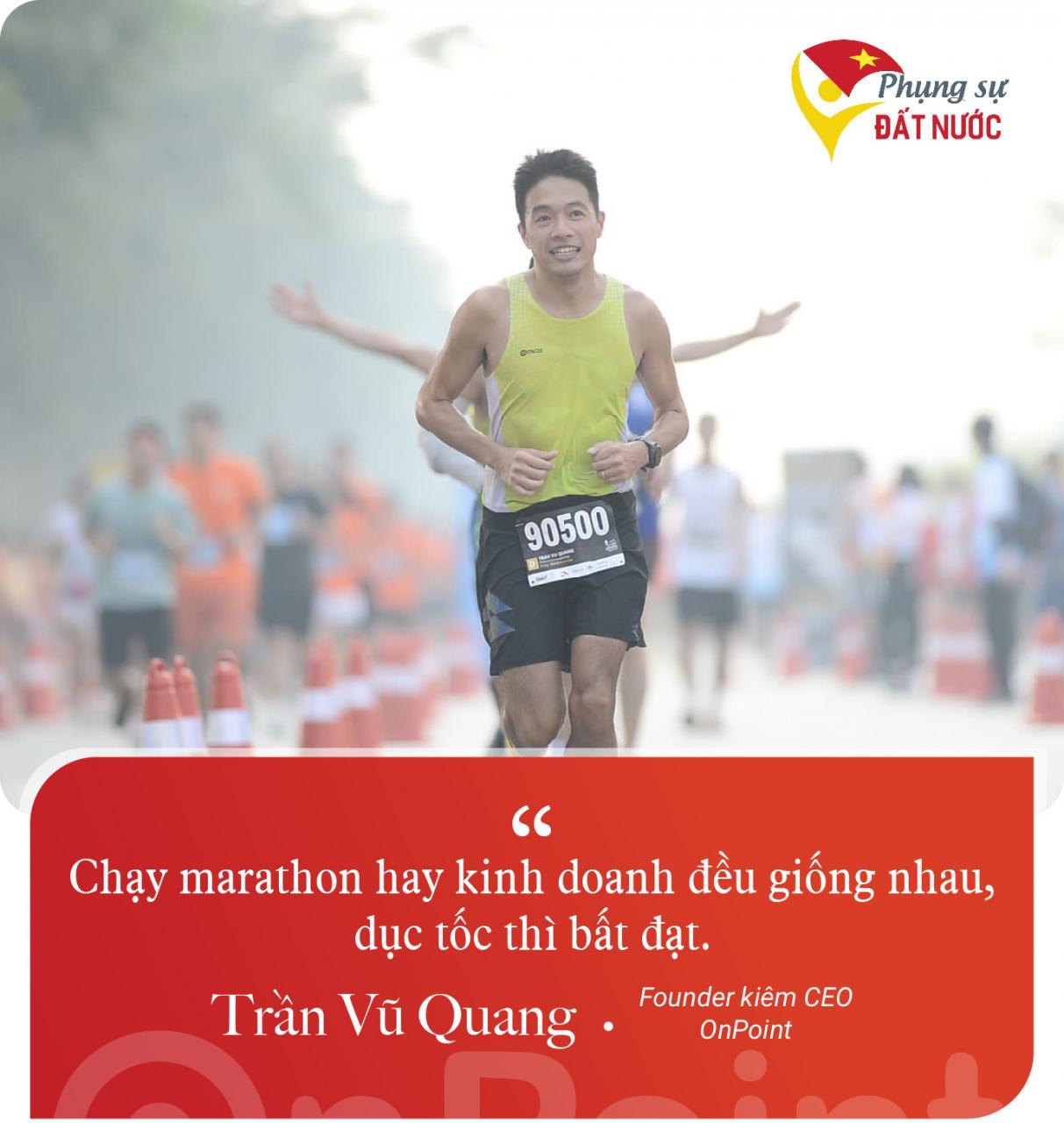
Through that, I have learned a lot from running a marathon to run a startup. Running a marathon or doing business is the same, haste makes waste. If you skip steps, do not have a solid foundation, do not have a method, you can only go fast for a while but cannot develop sustainably.
In business, without a solid foundation, it is like building a castle on sand. Running a marathon or starting a startup will always have moments of sprinting, but most of the time it is a long-distance, sustained run.
The nature of a startup is to go along for many years, about 10-15 years. So, the time period of doing a startup is very long, if you always sprint, you cannot develop strongly in the long term. You need to have endurance to run for a long time.
According to CafeF/Market Life
Vietnamnet.vn
source





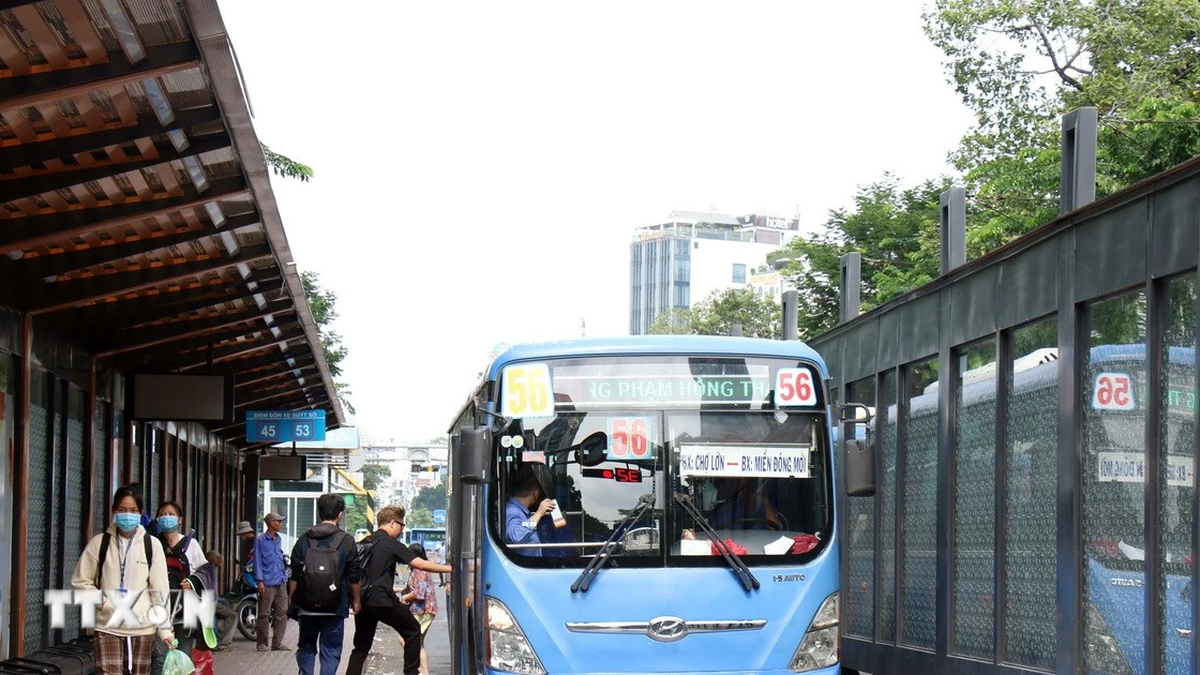

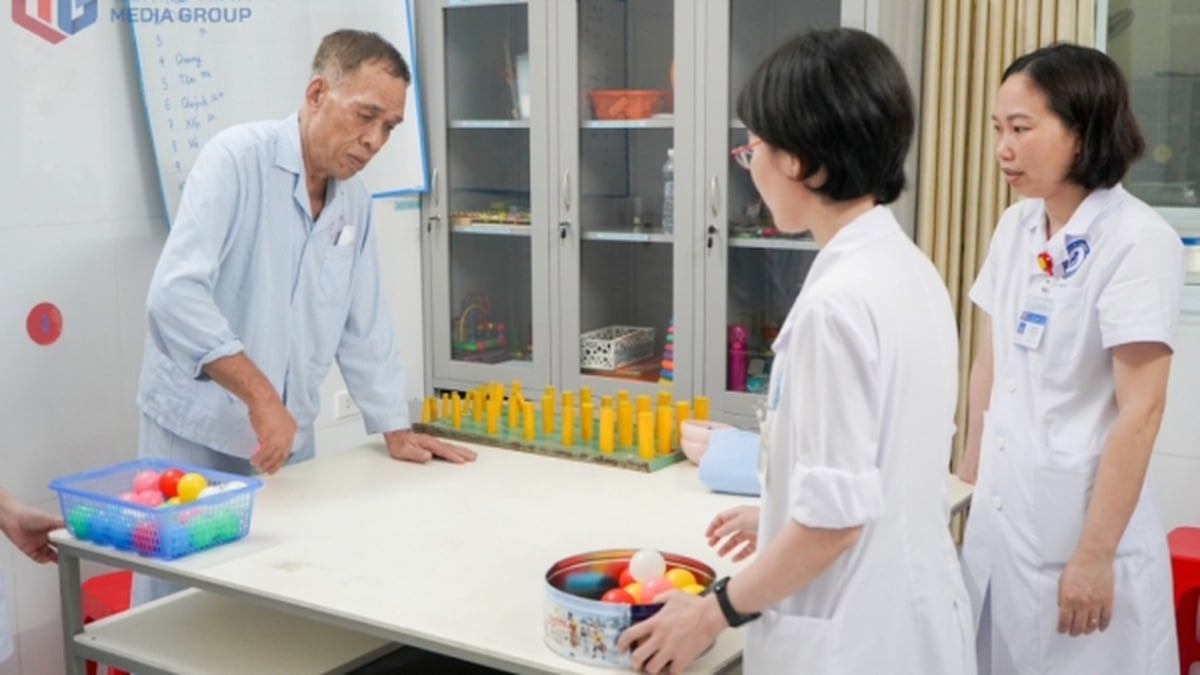

































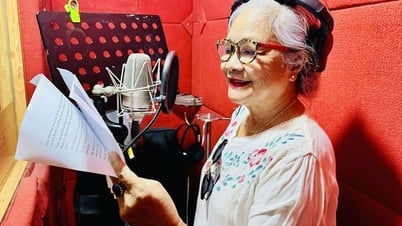











![[Maritime News] More than 80% of global container shipping capacity is in the hands of MSC and major shipping alliances](https://vphoto.vietnam.vn/thumb/402x226/vietnam/resource/IMAGE/2025/7/16/6b4d586c984b4cbf8c5680352b9eaeb0)














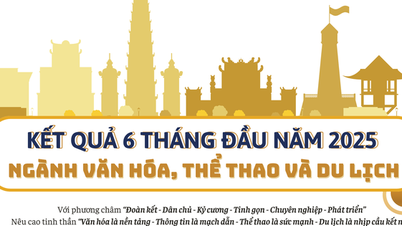




























Comment (0)